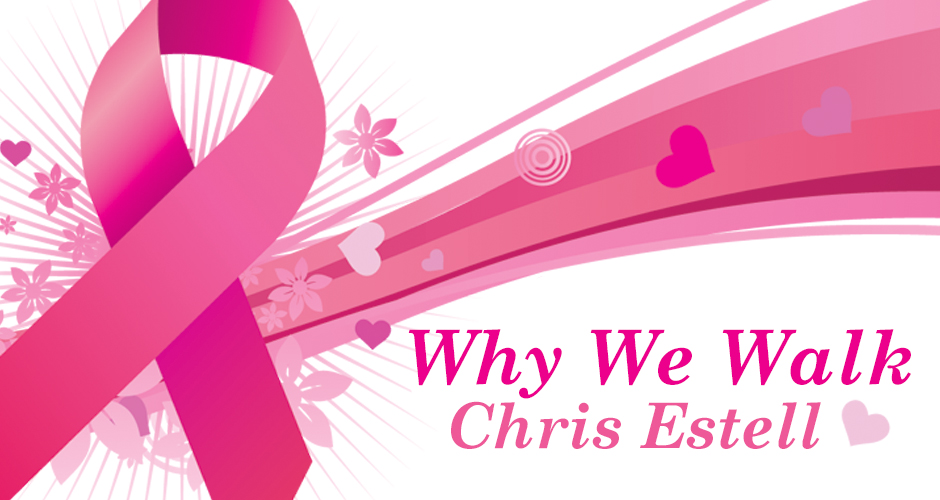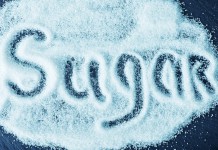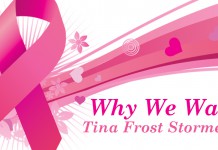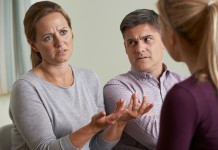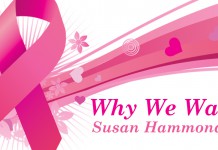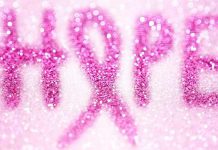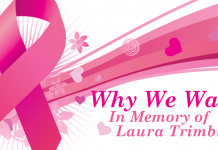People who participate in breast cancer walks typically have a reason for walking and a story to share. Throughout October, Healthcare Daily Online will be sharing testimonials from breast cancer survivors and their families, as well as family members who have lost loved ones during the battle.
Here is the survival story of Chris Estell, a grandmother of two who was diagnosed with breast cancer 25 years ago.
Her message: Educate yourself, ask questions and let family and friends help you. It’s okay to ask for help. It’s not a sign of weakness.
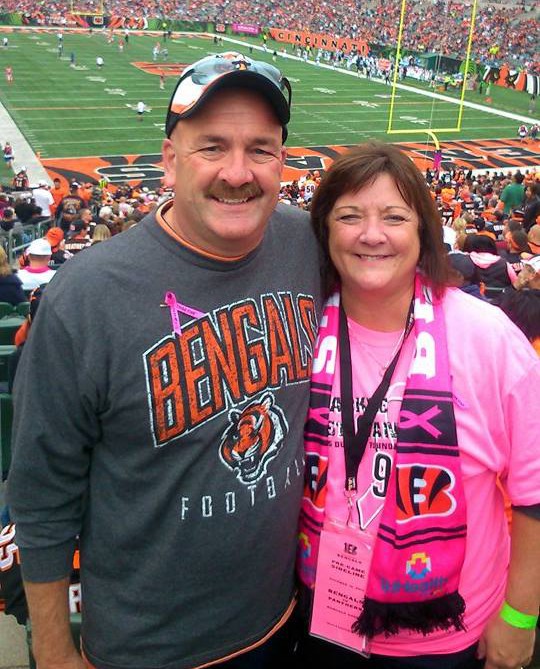
Can you briefly tell us a little about yourself?
My name is Chris Estell. I am 55 years old. My husband John and I have been married for 33 years. We have one son and two grandchildren.
How old were you when you were diagnosed with breast cancer?
I was diagnosed when I was 30 years old.
How was the cancer detected?
It was a lump I found on a self-breast examination. I went to several physicians who told me I was too young for breast cancer, and that it was probably a swollen milk duct. Thankfully, I worked in the medical field and had a mammogram done. The lump I felt did not show up on the mammogram but there were a few calcifications that looked suspicious.
So, I was scheduled for surgery. Doctors removed the lump and calcifications, and it turned out that both areas were cancerous. I had invasive ductal carcinoma (IDC) and ductal carcinoma in situ (DCIS) with negative lymph nodes. I was diagnosed with stage II breast cancer.
How did you and your family react to this news?
I thought, ‘how can this be?’ I had a three-year-old son that I wanted to see grow up. I needed to be there for my family. It was a personal choice and I decided to have a bilateral mastectomy and receive chemotherapy. My husband and my son put me in fight mode. It didn’t matter to me if I had three weeks or 30 years, I was going to fight this to the end.
What was the treatment process? How did this affect your family?
Treatment was very difficult. I didn’t think I could make it through chemo. Twenty five years ago, doctors did not have all of the anti-nausea drugs that they have today. After treatment, I would vomit all day. I would have to return to the office for IV’s two separate days just to get rehydrated.
I think that this was the closest to hell I could get. The mastectomy was nothing compared to the chemotherapy. Losing my hair was another struggle, but a friend suggested shaving my head. I thought this was a great idea – something I had control over. Thank God that my son only remembers my hair loss. I didn’t want him to be afraid of my appearance changing. Instead, I made it fun and would chase him around the house and make him feel my head.
[pullquote align=”full” cite=”” link=”” color=”” class=”” size=””]”My husband and my son put me in fight mode. It didn’t matter to me if I had three weeks or 30 years, I was going to fight this to the end.”[/pullquote]
How has breast cancer affected your outlook on life?
After my recovery, because of my medical background, I had the opportunity to apply for a position at Proscan Pink Ribbon Center. This has been so rewarding. Not only has it been my healing process but I feel I am here to give others hope. I am in a practice where I can educate women on how important it is to do self-breast exams, see their physician for a breast exam and get periodic mammograms.
What advice would you like to give people about breast cancer?
The best advice I can give anyone newly diagnosed is to educate yourself, ask questions (you are your best advocate) and let family and friends help you. It is okay to ask for help. It is not a sign of weakness.
Some people need to feel as though they are doing something to help. They love you and want to feel as though they are doing their part. Also, focus on taking one day at a time.
How can we raise more awareness about breast cancer prevention?
One of the best ways I’ve found to raise awareness is to volunteer in your community and do breast cancer walks. I have done Relay for Life, Susan G. Komen and the Making Strides for Breast Cancer for the past 25 years. There are plenty of organizations in every community.
[pullquote align=”left” cite=”” link=”” color=”” class=”” size=””]”Start young doing your self-breast examination. This could save your life. It did mine!”[/pullquote]
Why do you participate in breast cancer walks?
I have been on many teams with friends, family and co-workers. To this day, I still cry when I walk across the finish line. To be in the moment is AWESOME.
What is your message to people who may think they are too young to be diagnosed with breast cancer?
I never dreamed I would see my son start school. I have been very lucky to see him finish college, join the military, get married and give us the most beautiful grandchildren. Life truly is a blessing and I enjoy every moment. Start young doing your self-breast examination. This could save your life. It did mine!
*If you would like to share your story or know someone who may be interested, please contact us at social@www.bisk.com.


